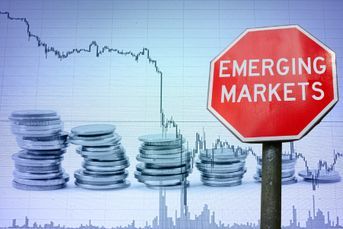Emerging-markets bond rout?
Wall Street’s biggest firms are predicting intensifying bond losses in emerging markets, where borrowing costs have already soared…
Wall Street’s biggest firms are predicting intensifying bond losses in emerging markets, where borrowing costs have already soared to the highest in more than four years versus U.S. corporate debt as the Federal Reserve considers curtailing record stimulus.
“We’re not yet convinced that we’ve seen the worst in terms of flows out of emerging markets,” said Jeffrey Rosenberg, the chief investment strategist in fixed income at BlackRock Inc.
Investors have yanked $22.1 billion from emerging-markets-bond funds since the end of April, almost five times the amount pulled from U.S. corporate credit, according to EPFR Global.
That has pushed the extra yield that buyers now demand to own dollar-denominated emerging-markets debt instead of U.S. company notes to 1.4 percentage points, about the most since December 2008.
Borrowing costs are soaring from record lows reached in January as speculation deepens that the Federal Reserve will curtail its quantitative easing as soon as this month, signaling an end to the flood of cheap money that propped up asset prices from China to India and Indonesia. The exodus from developing nations began after Fed Chairman Ben S. Bernanke told Congress on May 22 that the central bank could scale back the pace of its monthly $85 billion bond purchase if the U.S. economy showed sustained improvement.
“DEFENSIVE VIEW’
Emerging-markets debt has lost 7.9% since the end of April, versus a 5.1% decline on U.S. corporates, Bank of America Merrill Lynch index data show.
Although an expansion in the world’s second-biggest economy is accelerating, growth in China is projected to slow to 7.5% this year from as high as 14.2% in 2007, according to 53 economists surveyed by Bloomberg.
“Given the likelihood of further rate volatility and an uncertain emerging-markets growth outlook, we maintain our defensive view” on corporates from developing countries, analysts led by Eric Beinstein at JPMorgan Chase & Co. wrote in a Sept. 5 report.
Relative yields in emerging-markets bonds narrowed 8.9 basis points this month to 366.2 basis points, according to JPMorgan’s EMBI Global index.
The measure has averaged 307.4 this year.
Following average annual returns of 15.3% in the four-year period ended last December, dollar-denominated emerging-markets notes have lost 6.8% this year, according to Bank of America Merrill Lynch index data.
That compares with a 2.9% loss in 2013 on the Bank of America Merrill Lynch U.S. Corporate & High Yield index.
“Developed-markets paper has held in much better than emerging-markets paper,” said Stephen Antczak, the head of U.S. credit strategy at Citigroup Inc. “What worries me is, if you don’t have this natural support in place, you could get a disproportionate sell-off in emerging markets.”
AVOIDING INDIA
Yields on the Bank of America Merrill Lynch U.S. Emerging Markets External Debt Sovereign and Corporate Plus index have climbed to 5.73% after reaching an all-time low of 4.04% on Jan. 24.
The gap in yields in U.S. company debt widened to as much as 1.44 percentage points Aug. 31, the most since reaching 1.47 percentage points Dec. 1, 2008.
The $22.1 billion of outflows from emerging-markets-debt funds since May compare with $4.6 billion in withdrawals from U.S. corporate-bond funds, EPFR data show.
“When underperformance causes a sell-off in the market and liquidity worsens as a result, you have a huge gapping in risk valuation,” said Edwin Chan, the head of credit research at UBS AG in Hong Kong.
Although the rout eventually may present a buying opportunity — Mark McCombe, BlackRock’s Asia-Pacific chairman, said last Monday on Bloomberg TV that China’s economy is stabilizing and that he is “pretty positive on it” — losses for emerging- markets debt have the potential to accelerate, Mr. Rosenberg said.
Learn more about reprints and licensing for this article.








